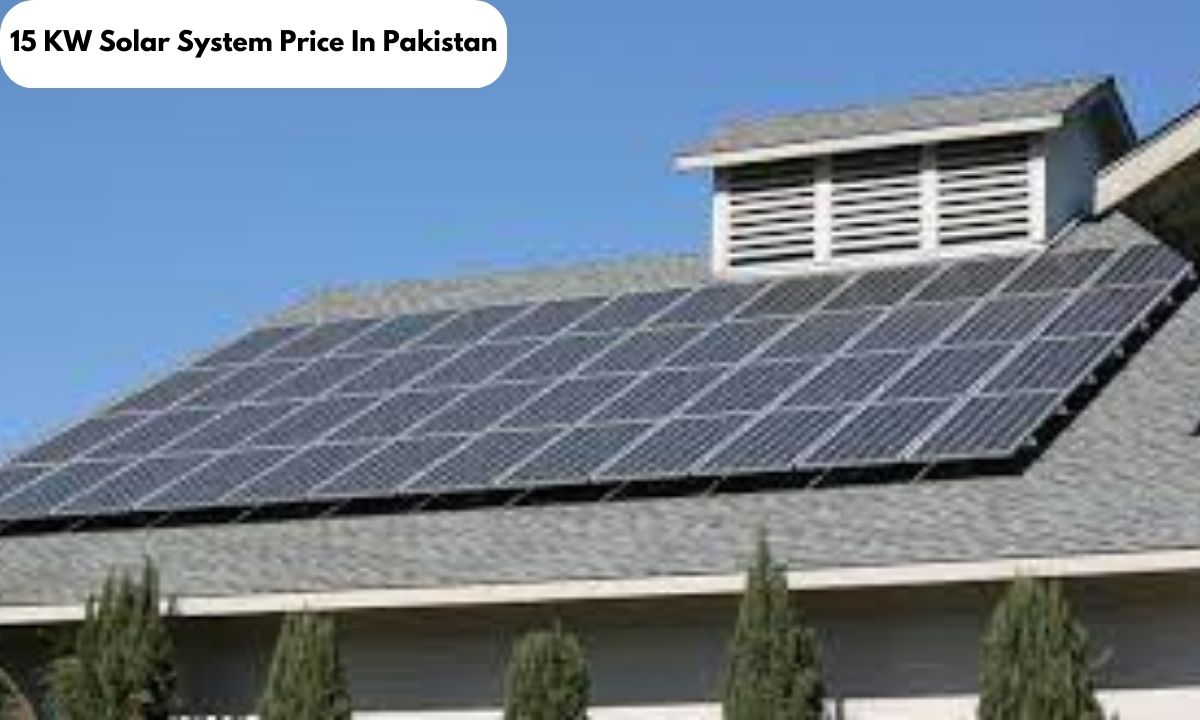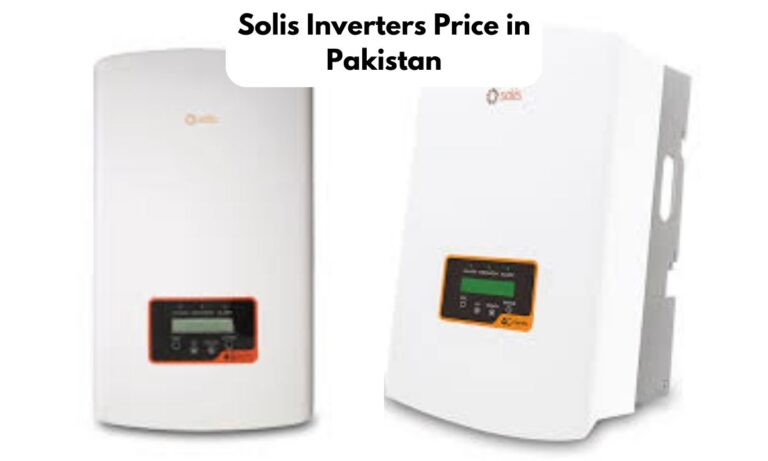15 KW Solar System Price In Pakistan (2024 Price Guide)
In the heart of South Asia, Pakistan is harnessing the power of the sun to fuel its future. With an installed solar capacity of 1.24 GW in 2022, a 17% increase from the previous year, the country is making strides in the renewable energy sector. Amidst this solar revolution, the 15kW solar system has emerged as a popular choice for both homes and businesses priced approximately between PKR 24-28 lacs.
This system offers a sustainable solution to meet moderate to medium-sized energy requirements. The investment in a 15kW solar system not only guarantees lower electricity rates for life but also contributes to a greener and more sustainable Pakistan.
As the country continues to face energy challenges, the adoption of solar energy, particularly systems like the 15kW, is not just a choice, but a necessity for a brighter and more sustainable future.

Understanding 15kW Solar Systems
The 15kW solar system stands as a green energy option suitable for powering homes or commercial establishments. Essential parts of this system include solar panels, a DC-to-AC inverter, mounting racks, necessary hardware, and connecting cables. These solar panels transform sunlight into direct electrical current (DC).
Typically, a 15kW system might need anywhere from 37 to 50 panels, depending on their individual power ratings. Afterward, the inverter changes this DC electricity into alternating current (AC) that can operate household or business devices.
Regarding space, setting up this 15kW system generally demands an area spanning 874 to 1,200 square feet. Whether this space is atop a building or on land depends on specific location needs and limitations.
Once in place, the system continuously turns solar energy into usable power. Ideally, under conditions of about 5 hours of sunlight daily and the panels facing south, this system might generate between 1,000 to 2,500 kilowatt hours (kWh) of AC every month. Still, the exact output can differ based on factors like location, equipment quality, and installation nuances.
Cost of 15kW Solar Systems in Pakistan
In Pakistan, the price tag of a 15kW solar system can swing based on various elements like the system’s type (be it on-grid, hybrid, or off-grid), the caliber of the components, and where it’s being set up. Typically, investing in a 15kW solar system might set you back between PKR 2,300,000 to PKR 3,500,000.
For instance, on-grid 15kW setups, which leverage net metering to considerably slash electricity costs, generally fall within the PKR 2.25 to 2.35 million brackets. Meanwhile, hybrid systems, offering both the perks of being connected to the grid and backup power, could hover between PKR 2.35 to 2.5 million.
If you’re looking at off-grid 15kW systems, especially useful for places distant from main electricity sources or businesses needing uninterrupted power, the costs might escalate to PKR 2.5 to 3 million due to their substantial battery requirements.
Yet, it’s essential to note that these prices can differ depending on where you’re shopping. For example, Premier Energy might quote you PKR 2,450,000 for a 15kW solar system, whereas W11STOP might provide estimates ranging from Rs. 3,000,000/- to Rs. 3,200,000/- when considering net metering.
Additionally, external factors like government taxes, shifts in tax policies, governmental strategies, or currency value changes can influence these prices. Moreover, the individual cost of parts like the solar inverter can also play a role in determining the total system cost.
Energy Production of 15kW Solar Systems
Investing in a 15kW solar system stands as a notable step towards embracing renewable energy, meeting a substantial portion of a property’s power requirements.
Typically, under conditions where the solar panels receive at least 5 hours of sunlight daily and are oriented towards the South, this system can generate between 1,000 to 2,500 kilowatt-hours (kWh) of AC power each month. This breaks down to an estimated 33 to 83 kWh daily, contingent upon specific environmental factors.
Factors Affecting Output Efficiency
Several elements can influence how much energy a 15kW solar system produces:
- Solar Irradiance: The quantity of sunlight reaching the panels, influenced by location and time of year.
- Panel Placement and Angle: For peak performance, panels should ideally face South and be angled correctly.
- Weather Patterns: Overcast skies, rainfall, or snow can diminish sunlight absorption by the panels.
- Panel Quality: Panels with higher efficiency can harness more sunlight, translating to more electricity.
- Design and Setup: Ensuring a well-thought-out design and precise installation is pivotal for optimal energy yield.
- Temperature: Extremely high temperatures might slightly reduce the efficiency of solar panels.
In essence, understanding and optimizing these factors can help maximize the benefits and efficiency of a 15kW solar system.
Benefits of Investing in a 15kW Solar System
Acquiring a 15kW solar system brings about numerous advantages, encompassing cost savings on energy bills, positive environmental impacts, and achieving energy self-sufficiency.
Economical Savings
Arguably, the standout benefit of the 15kW solar system is its potential to generate significant savings on your electricity expenses. Depending on local electricity tariffs and the actual solar energy output, homeowners might accumulate savings ranging from $20,000 to $96,000 throughout the system’s lifespan. In many instances, this solar system can effectively negate most of your electricity costs, substantially trimming down or even eradicating monthly bills.
Environmental Upsides
Harnessing solar energy means tapping into a sustainable and environmentally friendly power source. By converting sunlight into electricity, these systems sidestep the harmful emissions typically linked with conventional fossil fuel power production. Over the life of a 15kW solar system, its environmental impact could be akin to planting over 30,000 trees, given its carbon-neutral attributes.
Achieving Energy Autonomy
Relying on a 15kW solar system promotes energy self-reliance, especially beneficial for regions experiencing frequent power disruptions. Such systems can accumulate surplus energy during sunny periods for later use, ensuring uninterrupted power even during cloudy days or nighttime. Moreover, mechanisms like net metering empower households to supply excess energy back to the grid, further enhancing their independence from centralized power sources.
Payback Period and Return on Investment
In Pakistan, the time it takes to recover the cost of a 15kW solar system typically falls between 4 to 7 years. This duration hinges on various elements such as system pricing, sunlight availability, panel efficiency, and local electricity pricing.
Speaking of costs, setting up such a system in Pakistan might range from PKR 1,840,000 to PKR 3,500,000. The final cost is influenced by the system type (be it on-grid, hybrid, or off-grid), component quality, installation site, and whether the setup includes batteries.
Daily, a 15kW solar arrangement in Pakistan has the potential to produce around 50 to 75 kilowatt-hours (kWh) of electricity. This translates to roughly 1500 to 2250 kWh every month. Such output can notably reduce your electricity expenses, paving the way for a quicker return on your initial investment.
When we discuss Return on Investment (ROI), it’s essentially a gauge of how profitable the venture is. For solar systems, you determine ROI by comparing the net gains from saved electricity expenses against the setup’s total cost. Given the notable savings possible with a 15kW solar system, the ROI tends to be promising. Still, the precise ROI figures will hinge on individual installation details and the aforementioned influencing factors.
Government Policies and Incentives
Pakistan’s government has rolled out multiple measures to boost the adoption of solar energy, aiming to enhance energy reliability and align with environmental targets.
Government Backing
A notable move by the government is the introduction of net metering. This system empowers households and businesses to produce surplus solar energy, which they can then channel back into the grid. By doing so, they earn credits, leading to financial savings and spurring the embrace of solar setups. Additionally, the Feed-in Tariffs (FiTs) play a pivotal role. These tariffs assure energy producers a steady income through extended contracts, thus incentivizing more investments in green energy.
Furthermore, to make solar solutions more financially attractive, the government extends tax breaks and subsidies specifically for solar panel installations. Such financial incentives notably diminish the initial expenses, rendering solar investments more feasible for both households and commercial entities. In tandem, the Alternative Energy Development Board (AEDB) provides a generous 30% grant for solar panel installations. Complementing this, the State Bank of Pakistan has rolled out financing options for solar ventures at favorable interest rates, further propelling solar energy investments.
Governmental Influence on Solar Costs
These government-backed measures undeniably influence the pricing dynamics of solar systems within Pakistan. Through subsidies and tax reliefs, the initial investment costs for solar installations decrease considerably. The net metering system offers consumers the advantage of offsetting their power bills by selling surplus solar energy, further optimizing the system’s overall cost-efficiency. Nonetheless, while these governmental efforts democratize solar energy access, external factors like currency fluctuations and equipment import costs continue to shape the precise per-watt pricing of solar energy solutions in Pakistan.
Choosing the Right Provider
Key Considerations When Selecting a Solar System Supplier
When venturing into selecting a solar system supplier, it’s essential to factor in several aspects:
- Assessing Your Energy Requirements: Begin by gauging the amount of energy essential for your home or business operations. This assessment guides you in pinpointing the suitable size and category of the solar system tailored to your needs.
- Financial Planning: Always keep your budget in mind. Given the diverse price tags of solar systems, aligning with a provider that matches your financial parameters is crucial.
- Equipment Standards: Prioritize the caliber of components like solar panels, inverters, and storage batteries. Opting for top-notch quality ensures enhanced efficiency and longevity.
- Installation Expertise: The prowess of the installation team is paramount. Ensure your chosen provider employs skilled technicians capable of executing flawless installations and optimizing your solar system’s performance.
- Understanding Warranty Terms: Delve into the warranty details provided by potential suppliers. Typically spanning 20 to 25 years, a robust warranty not only safeguards your investment but also assures long-term system reliability.
- Maintenance Provisions: Familiarize yourself with the maintenance requisites of the solar system. Some suppliers extend maintenance packages, a beneficial offering that warrants consideration.
- Assessing Provider Reputation: Lastly, prioritize suppliers with commendable reputations. Perusing customer testimonials and reviews offers invaluable insights into a provider’s trustworthiness and service excellence.
Top Solar System Providers in Pakistan
Pakistan boasts several esteemed companies championing the advancement of solar energy. Here’s a concise list of prominent solar system providers within the nation:
Alpha Solar: Renowned for its versatility, Alpha Solar caters to installations of varying scales, be it residential, commercial, or industrial.
Premier Energy: Offering world-class solar solutions, Premier Energy serves both individual and corporate clientele, presenting a diverse array of solar systems complemented by distinct warranty options.
SkyElectric: SkyElectric stands out prominently in Pakistan’s solar landscape, celebrated for its commitment to delivering top-tier solar solutions.
Pantera Energy: With expertise spanning on-grid, off-grid, and hybrid solutions, Pantera Energy has solidified its reputation in the solar sector.
Reon Energy: As a frontrunner in Pakistan’s solar arena, Reon Energy is committed to pioneering alternative energy solutions.
Pak Solar: Committed to propelling solar energy’s prominence, Pak Solar steadfastly champions sustainable energy initiatives.
When navigating these options, it’s pivotal to align your choice with your unique requirements and situation. Thorough research and a holistic evaluation of all considerations will guide you to the optimal decision.
Conclusion
In Pakistan, a 15kW solar system stands out for its numerous advantages: notable reductions in electricity expenses, a commitment to environmental preservation, and the quest for energy autonomy. Amplifying these benefits are supportive government policies and incentives that make solar adoption both feasible and economical.
Opting for a trustworthy provider guarantees top-notch quality and service. Yet, the move towards solar energy is about more than just personal gains. It signifies Pakistan’s broader journey towards sustainability, ensuring energy resilience and playing a pivotal role in combating climate change. Given Pakistan’s ample sunlight, embracing this renewable energy source paves the way for a luminous and sustainable tomorrow.





